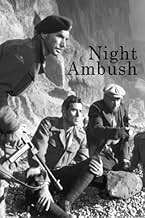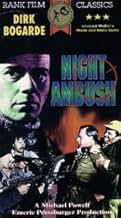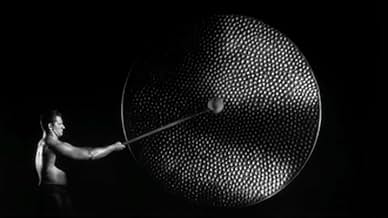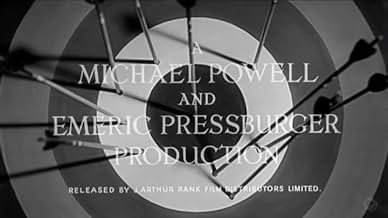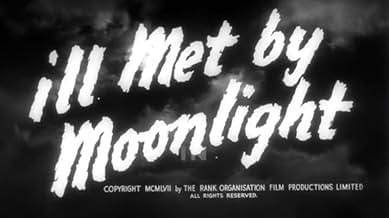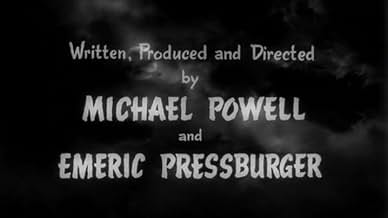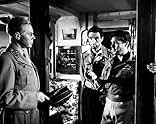IMDb RATING
6.5/10
2.1K
YOUR RATING
Led by British officers, partisans on Crete plan to kidnap the island's German commander and smuggle him to Cairo, Egypt to embarrass the occupiers.Led by British officers, partisans on Crete plan to kidnap the island's German commander and smuggle him to Cairo, Egypt to embarrass the occupiers.Led by British officers, partisans on Crete plan to kidnap the island's German commander and smuggle him to Cairo, Egypt to embarrass the occupiers.
- Directors
- Writers
- Stars
- Directors
- Writers
- All cast & crew
- Production, box office & more at IMDbPro
Featured reviews
On the Greek island of Crete during WWII, British agents are assisted by local partisans fighting the Nazi occupation. One night on a beach, they welcome Major Patrick Leigh Fermor DSO (Dirk Bogarde) and Captain Bill Stanley Moss MC (David Oxley) of the British Special Operations Executive (SOE). They come up with a plan to kidnap German commander Major General Kreipe (Marius Goring).
It's a British war movie based on real people. The Italian locations look great and seem pretty close. There is a bit of espionage and some action. Mostly, it's collegial cat and mouse stuff. I would have liked to see the big ambush. The movie should follow Niko after the gold coin until the ambush happens. It's missing the big action finish.
It's a British war movie based on real people. The Italian locations look great and seem pretty close. There is a bit of espionage and some action. Mostly, it's collegial cat and mouse stuff. I would have liked to see the big ambush. The movie should follow Niko after the gold coin until the ambush happens. It's missing the big action finish.
Like 'Spleen', I first thought that we were seeing genuine Cretan landscapes. But what puzzled me was not being able to recognise any of it - even allowing for change - especially the coastline where Moss and his party landed. (In his book, he refers to a distinctive landscape) A little digging - on this site- revealed that the film was made in France and Italy with no mention of Crete. The title, 'Ill met by moonlight' surely refers to the 'meeting' of Kreipe and his abductors. The film couldn't really show the fact that Leigh Fermor and Moss et al attempted the abduction on the four evenings that preceeded the actual abduction. The earlier attempts were abandoned because Kreipe came along whilst it was too early for moonlight! (one wonders why was it necessary to change the title for the US market?) I thoroughly enjoy the film, watch it every opportunity and each time pick up something that I've missed previously. However, I cannot help but wonder how much better it might have been if the writers had stuck more closely to the original script throughout. They had informed advisers available, Micky Akoumianakis was a true participant, and Houseman was in Crete as an British agent for a long part of the occupation. Though thoroughly grounded in fact, the few 'elaborations' detract from what was surely a solid enough story to stand on its own.
Regardless of the differences, I continue to regard the film as one of my most favourites.
Regardless of the differences, I continue to regard the film as one of my most favourites.
"Ill Met by Moonlight" is a different kind of film for The Archers, and sadly, their last venture together.
It's a World War II film, based on real-life events in Crete, about the British army and members of the Crete resistance who kidnap a German officer (Marius Goring) in order to send him to Egypt.
The British are headed up by Dirk Bogarde.
It's a slow moving film, without a tremendous amount of suspense, but I have to say I enjoyed it. It's rich in humor and examples of camaraderie among the soldiers and resistance workers. The photography is excellent, though it's no Black Narcissus.
The problem with it is that it isn't up to the usual standards of Powell and Pressburger and not representative of them. I do love Dirk Bogarde, though, in everything.
It's a World War II film, based on real-life events in Crete, about the British army and members of the Crete resistance who kidnap a German officer (Marius Goring) in order to send him to Egypt.
The British are headed up by Dirk Bogarde.
It's a slow moving film, without a tremendous amount of suspense, but I have to say I enjoyed it. It's rich in humor and examples of camaraderie among the soldiers and resistance workers. The photography is excellent, though it's no Black Narcissus.
The problem with it is that it isn't up to the usual standards of Powell and Pressburger and not representative of them. I do love Dirk Bogarde, though, in everything.
I re-watched this as I am currently reading the history of Crete during WW2. Many of the component parts of the true events are in the movie, which makes it a pretty good representation of what happened without it being a documentary. Of course, you have to factor in the 1950s acting and effects limitations but, having read a little about the real-life players, it wholly underplays events. Those guys spent a long time in the mountains fighting the Nazis - might have made them a little crazy.
With Crete resistance deftly trying to undermine the occupation of the German army, a cunning plan is prepared that will undermine them by pulling off a daring coup from right under their noses. With only a handful of Cretan resistance fighters, Major Fermor and Captain Moss attempt to kidnap the head of the German army on Crete Major Kreipe. With considerable ease they pull off the kidnapping but they still need to get off the island with their polite but dangerous quarry.
On one night last week I decided to sit down and watch two films that I had taped both by the legendary Powell and Pressburger (the other being The Canterbury Tale). I sat down to Ill with reasonable expectations as it was to have been their final film together and I had hoped that they would have gone out on a bang by giving the overworked (at the time) genre of war movies a real boost. Based on a real mission (from Captain Moss' memoirs) this film is a good example of the genre but, other than that, there isn't a great deal to recommend it for. The plot is interesting even if they have stripped away a great deal of detail from the story and replaced it with some humour and some stiff upper lips but it has nothing extraordinary about it that would make it stand out from the crowd. The film has a couple of laughs in it but mostly it is a rather serious film in a way this is not a bad thing as it avoids the usual flag waving quite well and focuses on being a solid story as opposed to a morale booster.
Other reviews have commented on the beauty of Crete's landscapes as filmed here but as far as I am aware the film was made in parts of mainland Europe but I take the point the film, mostly external shots, looks great throughout. Aside from the landscapes though there is nothing that really makes it stand out as a Powell & Pressburger film in fact perhaps the extraordinary thing about the film is how unextraordinary it was; if I hadn't known that it was from the Archers then I would never have guessed. The cast match their material with a fairly ordinary series of performances.
Bogarde seems very relaxed in the lead and he is enjoyable even if it would not even register on the radar of his best performances. Oxley is not as good as he has a straighter role to allow Bogarde to carry himself with more of a swagger without off-balancing the film; he is a bit flat at times but mostly he does well. Goring plays it very well and he is an enjoyable sportsman in contrast to the feeble Nazi's that the genre would throw up during the war. The Greek support cast are not as heroic as I think their real lives deserved but they are used well for comic effect.
Overall this is a solid entry into the genre that tells it straight with some humour and a good steady pace nothing special but it avoids the flag waving that the genre often falls into. However, when you are talking about a Powell and Pressburger film then, although I enjoyed it, one has to feel a bit of regret that such famous names ended their famous partnership with a film that is regularly called 'ordinary'.
On one night last week I decided to sit down and watch two films that I had taped both by the legendary Powell and Pressburger (the other being The Canterbury Tale). I sat down to Ill with reasonable expectations as it was to have been their final film together and I had hoped that they would have gone out on a bang by giving the overworked (at the time) genre of war movies a real boost. Based on a real mission (from Captain Moss' memoirs) this film is a good example of the genre but, other than that, there isn't a great deal to recommend it for. The plot is interesting even if they have stripped away a great deal of detail from the story and replaced it with some humour and some stiff upper lips but it has nothing extraordinary about it that would make it stand out from the crowd. The film has a couple of laughs in it but mostly it is a rather serious film in a way this is not a bad thing as it avoids the usual flag waving quite well and focuses on being a solid story as opposed to a morale booster.
Other reviews have commented on the beauty of Crete's landscapes as filmed here but as far as I am aware the film was made in parts of mainland Europe but I take the point the film, mostly external shots, looks great throughout. Aside from the landscapes though there is nothing that really makes it stand out as a Powell & Pressburger film in fact perhaps the extraordinary thing about the film is how unextraordinary it was; if I hadn't known that it was from the Archers then I would never have guessed. The cast match their material with a fairly ordinary series of performances.
Bogarde seems very relaxed in the lead and he is enjoyable even if it would not even register on the radar of his best performances. Oxley is not as good as he has a straighter role to allow Bogarde to carry himself with more of a swagger without off-balancing the film; he is a bit flat at times but mostly he does well. Goring plays it very well and he is an enjoyable sportsman in contrast to the feeble Nazi's that the genre would throw up during the war. The Greek support cast are not as heroic as I think their real lives deserved but they are used well for comic effect.
Overall this is a solid entry into the genre that tells it straight with some humour and a good steady pace nothing special but it avoids the flag waving that the genre often falls into. However, when you are talking about a Powell and Pressburger film then, although I enjoyed it, one has to feel a bit of regret that such famous names ended their famous partnership with a film that is regularly called 'ordinary'.
Did you know
- TriviaAccording to Michael Powell's book, "Million Dollar Movie," composer Mikis Theodorakis considered it shameful that a story about Cretan resistance fighters would be told by anyone other than Cretans. He told Powell and Emeric Pressburger that they were both political interlopers, a label he also used in describing Sir Patrick Leigh-Fermor.
- GoofsWhile waiting to ambush the General's car, another vehicle is heard approaching. Elias listens, the pronounces that it is a Volkswagen. While Volkswagen GmbH was technically in existence at the time, the vehicle in question wouldn't have been called a Volkswagen---it was known as a Kubelwagen (bucket-car), while the better-known Beetle was a KDF-wagen.
- Quotes
Maj. Patrick Leigh Fermor aka Philedem: Field Marshal Rommel won't be in Cairo but you will be!
- Alternate versionsThe UK version of the film, titled "Ill Met by Moonlight", is 11 minutes longer than the version originally released in American markets.
- ConnectionsFeatured in Made in England: The Films of Powell and Pressburger (2024)
- How long is Night Ambush?Powered by Alexa
Details
Box office
- Budget
- £212,019 (estimated)
- Runtime1 hour 44 minutes
- Color
- Aspect ratio
- 1.85 : 1
Contribute to this page
Suggest an edit or add missing content


